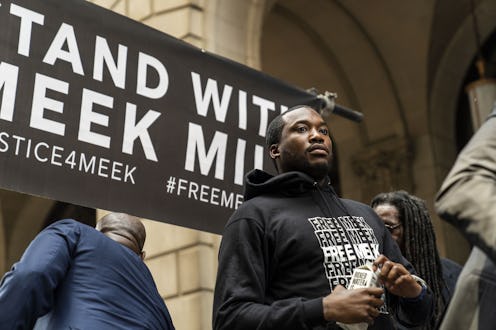
Amazon's Free Meek chronicles rapper Meek Mill's decade-plus legal battle after being arrested at the age of 19. He says in the docuseries that when Judge Genece Brinkley sentenced him to 11 to 23 months in prison and seven years of probation for charges of drug possession, firearms violations, and simple assault in 2008, he felt somewhat relieved knowing it could have been worse. But as time has worn on, that decision — and the judge herself — have become quite controversial.
Brinkley presided over Meek's first trial in 2008, and has continued to oversee his case since then — at least, up until recently. Meek ended up serving five months of her original sentence, but due to his parole, found it difficult to navigate his increasingly busy music career after his release.
In the ensuing years, Brinkley ruled he'd violated his probation for scheduling performances to promote his first CD and forbade him from touring for a month, as well as ordered him to take etiquette classes, the Philadelphia Inquirer reported. In 2014, she sentenced him to another three to six months in prison (he served five) for ignoring her orders not to schedule more concerts; per CBS, he was also given another five years of probation. Finally, in 2017, Brinkley sentenced him to two to four years in prison for violating his parole, citing a failed drug test, violation of travel restrictions, and two arrests outside of Philadelphia. The ruling incited widespread protests from fans, and Meek was released in April 2018.
After the 2017 sentencing, Meek's legal team accused Brinkley of inappropriate and "vindictive" behavior toward the rapper, according to the New York Times, which they reassert in Free Meek. When reached for comment by Bustle, Brinkley's lawyer A. Charles Peruto said she is "not allowed to comment," but that in his opinion, "Roc Nation and the rest of Mill's team has no regard for the truth," and that "the accuracy of [the docuseries] is equal to a 10 day weather forecast." Speaking to the Philadelphia Inquirer in May, Peruto said Brinkley "has treated [Meek] the same way she has treated her other probationers."
Among the claims Meek's legal team has made against Brinkley are that she requested Meek include her name in a song and gave him unsolicited advice on who should manage him. "She's exhibited enormous bias," Meek's lawyer Joe Tacopina told the Times. An anonymous Philadelphia attorney who spoke to Rolling Stone in 2018 made similar allegations, claiming Brinkley "puts long-tail probations on young black men, then jerks them back to jail for small infractions." (Brinkley declined to comment when reached by Rolling Stone).
In December 2017, Newsweek reported that Brinkley was under FBI investigation for Meek's claims. And this July, three Philadelphia judges ruled to remove Brinkley from his case. They also overturned Meek's 2008 conviction; a hearing on Aug. 27 will determine whether he'll get a retrial, or if the case will be thrown out entirely.
What will happen in Meek's case now remains to be seen, but Brinkley will no longer be involved.